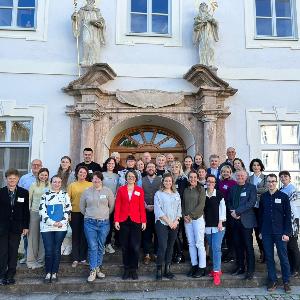Ukraine digital support program: Expertise at the patient’s bedside
22 Dec 2022
Staff from LMU’s Department of Medical Education are helping lecturers from Ukraine to apply digital learning capabilities in medical education in a time of crisis.
22 Dec 2022
Staff from LMU’s Department of Medical Education are helping lecturers from Ukraine to apply digital learning capabilities in medical education in a time of crisis.

On site, the head of the Frauenwörth seminary administration, Sister Scholastica McQueen, supported the project. | © DAM / LMU
No one becomes a good doctor without a wealth of in-depth knowledge. Building on this knowledge, it is then critical to gain experience in treating patients and practicing “bedside skills”. In the shape of its program “Ukraine digital: Ensuring academic success in times of crisis”, the German Academic Exchange Service (DAAD) is doing its bit to help Ukrainian students pursue their studies on a high level even under difficult wartime conditions. That is especially important in a medical context: Ultimately, patients’ safety is directly dependent on the quality of the teaching provided.
Funded in the amount of 250,000 euros, the DAAD project was realized by LMU’s Institut für Didaktik und Ausbildungsforschung in der Medizin (DAM, Department of Medical Education) in cooperation with the Charité University Hospital in Berlin. In November of this year, following months of complex preparations, project leader Professor Dr. Martin Fischer, his colleagues Karolin Dospil and Matthias Witti and a team of LMU teaching staff welcomed 25 lecturers from 14 different Ukrainian university faculties to a one-week seminar on the island of Frauenchiemsee and at the Munich University Hospital. The guests then traveled to Charité in Berlin for a further week of seminars.
The objective was to help the lecturers incorporate case-based tuition formats in their curricula in order to teach clinical decision-making skills and, in this way, contribute to a higher quality of teaching and patient care. This is important because the war in Ukraine is forcing many faculties to switch to online tuition. At the same time, the fact that hospitals in Ukraine are mainly treating wounds received in combat makes for less than ideal conditions in which to teach broad-based medical skills and train students in systematic diagnostics in the context of contact with patients.
To optimize medical education, it is not enough merely to digitize lectures. You need to use teaching formats that let the students prepare for and practice making decisions at the patient’s bedside.Martin Fischer
“As a rule, it is relatively easy to deliver cognitive teaching formats online,” Martin Fischer says. “But to optimize medical education, it is not enough merely to digitize lectures. You need to use teaching formats that let the students prepare for and practice making decisions at the patient’s bedside.”
Such formats have been part and parcel of medical teaching at LMU for a number of years. About 20 years ago, steps to reform the study of medicine in Germany began to give the discipline a more active focus. Since then, tuition has been based on teaching knowledge and practical skills. One key focus is on communication with patients and their relatives, as well as with colleagues in interprofessional teams. Fischer sums up the rationale behind this approach: "It can never be enough to have students who are excellent at putting ticks in the right boxes in exams, but who are not sure of themselves when dealing with real patients.”
Students are only too willing to try out the option of improving their conversational skills and obtaining solid feedback in role-play situations with actors. In addition, all kinds of virtual patient cases are available and can be worked through interactively in a multimedia setting on the computer.
When discussing such cases, the students slip into the role of, say, a general practitioner confronted by a 42-year-old patient with chest pains. Or they might become a junior doctor in the emergency department of a municipal hospital who is expected to diagnose why an 80-year-old has fainted several times. Using questions, photographs and film material, the students document their findings, propose differential diagnoses, decide what to examine and weigh up therapeutic alternatives. In so doing, they are able to hone their clinical decision-making skills.
The pandemic gave a further boost to the development of this format. Drawing on the Nationaler Kompetenz-basierte Lernzielkatalog Medizin, NKLM (National Catalogue of Competence-Based Learning Objectives in Medicine), a large number of new virtual patient cases has been produced and shared with all German faculties.
Under the aegis of the DAAD project, Karolin Dospil has now had 80 of these virtual patient cases translated into Ukrainian. The cases are now available to the seminar participants for tuition purposes.
Reactions to the project were “extremely positive to enthusiastic”, in the words of Martin Fischer. “The participants are very keen to carry on and establish new teaching formats as a permanent feature at their universities.” A follow-up application to make this happen has already been approved. Accordingly, the intention is to continue dialogue with Ukrainian colleagues even beyond the current crisis situation.
“It is a chance to show collegial loyalty in a very hands-on way and to help people in Ukraine,” Fischer explains. “We can also play a part not only in keeping tuition running in Ukraine but also in modernizing it. Faced with all the misery of war, that is a tremendous opportunity.”